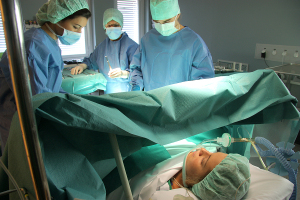Bringing AI to the OR showcases promising future for healthcare
June 22, 2021
Artificial Intelligence
Operating Room

By Dr. James Clark
It is an incredibly exciting time to be a physician as medical technology advancements continue to transform health care in new and positive ways. This is especially true in surgery, thanks to digitalization and the use of artificial intelligence (AI).
With this transformation in its early stages, I am actively studying the ways in which digitizing surgery and bringing AI to surgical theatres can enhance surgical practice, with a focus on how it impacts surgical training, governance, and patient safety. As a Gastrointestinal and Bariatric surgeon—and an academic with a Ph.D. from Imperial College London in surgical technologies, including digitization of surgery—as well as specialty lead for surgery at The Royal Cornwall Teaching Hospital NHS Trust, this research topic is something I am particularly passionate about.
Why recording surgery matters
Recording operative videos will no doubt become standard practice over the next decade. The benefits are undisputable and range from a positive impact on surgeon training, surgical safety but above all transparency for patients.
Videos, especially supported by AI, enable surgeons to give specific and detailed feedback to trainees immediately after a procedure rather than in the middle of the operation, which is a high-stakes environment. I’m working on exciting research into whether surgical trainees are improving their technique from using the AI-enabled surgical video tools. While the results are not yet available early results are very exciting and are confirming the positive impact on our trainees. Objectively, their feedback about how using these tools improves performance from case to case, as well as their confidence in the OR, has been broadly outstanding.
It is not just the trainees that benefit, but experienced surgeons have also benefited. Being able to review any operation, whether for training purposes with a trainee or with colleagues afterwards, promotes self coaching. It enables surgeons to discuss, compare with colleagues, and adjust their approaches in a more relaxed setting. Even amongst more tenured surgeons, colleagues can share techniques and validate any difficult decisions they had to make to ensure these can be recognized if they were to arise again, and learned decisions can be reenacted or avoided. This capability is unique within an online easily accessible shared library of surgical videos.
Sharing videos also enables surgeons to have the real time details they need to have meaningful conversations with other specialists over a case, rather than simply using the notes. This may be relevant, for example, when a patient is transferred from the OR to ITU for handover to the intensive care team when the clarity of what has been undertaken in the operation provides great insight for their onward care. A specific example from my experience was during a recent laparoscopic bile duct exploration for gallstones during which time the anatomy was not exactly what the preoperative imaging had indicated. I made the decision, as the operating surgeon, to open the bile duct, remove the stone, and sew it back up. After the procedure, the patient had a narrow section of the bile duct and this was discussed with our locoregional centre. With the recorded video on hand, I was able to share the operation with those working at the centre to consult on the case and confirm that I made the right call for the patient under the circumstances. The reassurance for both the patient and myself was welcomed, and this would have been difficult to explain with clarity without the video. Overall, having video streamlines the process of referring, refining skills, broadening knowledge and evidenced learning.
|
|
|
You Must Be Logged In To Post A Comment
|
